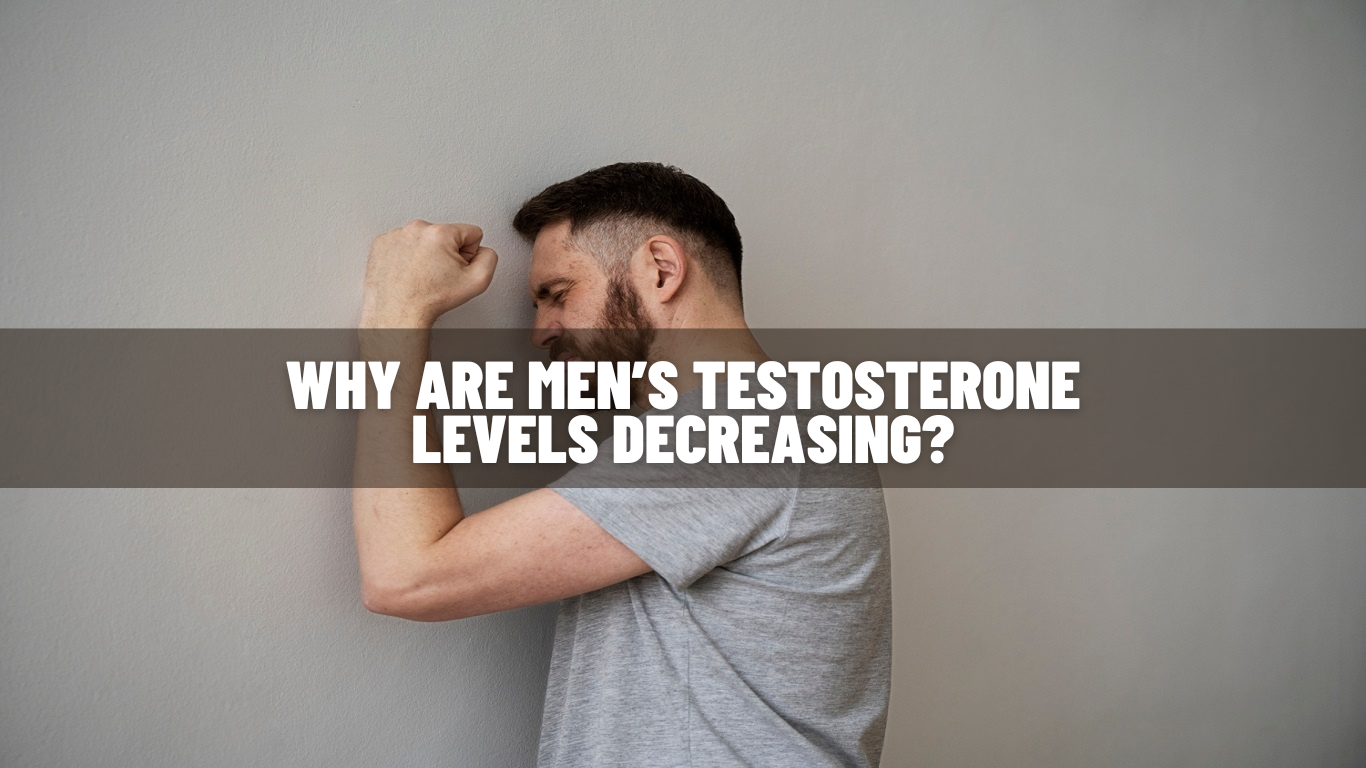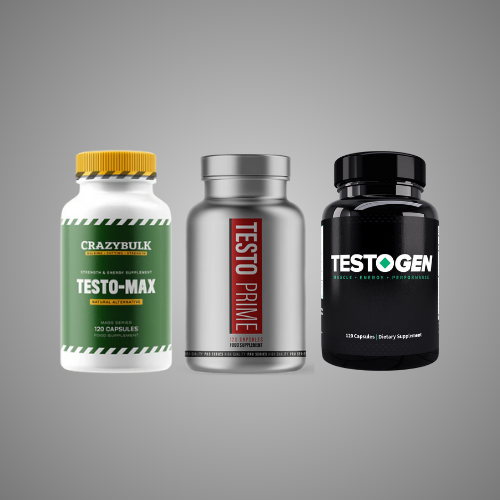Why Are Men’s Testosterone Levels Decreasing? Known Factors!

Historically, if you look it up, men’s testosterone levels have been on the decline for generations. For instance, your great-grandfather may not be technologically as informed as you but when it comes to testosterone health, he may have outperformed you (in a normal scenario). Well, testosterone levels do drop with age, and as you cross 60, you will likely notice a significantly low production. But here we are talking about a population-level decrease in testosterone.
Unlike what most people presume, it isn’t really how much time you are spending at work vs. the time you are dedicating at home or off your work hours. It is actually the lifestyle choices that are to be blamed – modern-day diet, sedentary habits with no exercise regimen, and the adverse environment surrounding us.
In this article, we delve into the various factors affecting testosterone levels in men and see what changes you can bring in to benefit your health. Let’s take a look.
Decline In Testosterone Levels Demographically
While most of the factors responsible for a decline in testosterone that we are evaluating today are quite similar to individual determinants, we will still take them into account from a societal perspective. These aspects at an individual level are also running their course on millions of men out there.
For instance, if you take obesity or body weight as one of the determinants, this is certainly one of the key reasons behind a person’s testosterone deficiency. However, it isn’t just one person’s problem. I have found studies showing that obesity serves as a factor in the case of many men suffering from the same condition across the globe.
Similarly, even though age can naturally affect testosterone production in men, there are research findings confirming that even after the decline, the testosterone concentration in men back then is higher than that of those who are born in the later years. The reason is men are going with the flow of convenience.
Age-Related Generation Decline
There are studies that report a declining trend in testosterone levels in men of similar age groups from earlier years to later-born subjects. For instance, in a comparative study to evaluate the serum testosterone levels in a 65-year-old person in 1988 vs. a 65-year-old in 2003, researchers found that there was a certain percentage decline in the person born in 2003.
Two more studies, one from 2007 (conducted on the Danish population) and the other published in the more recent year 2013 (On the Finnish population) further confirm that testosterone levels have dropped with time. This is substantial data showing the difference in the levels between aged millennials and aged Gen Zers.
Now let’s take a closer look at the factors that have been controlling testosterone health for decades.
Factors Behind Decreasing Testosterone Levels
Below are the main reasons behind the decline in testosterone levels in men with time:
Obesity

Obesity has been a rising trend for several reasons. Of course, we are going to discuss the various factors in a bit like exercises, poor dietary choices, or inactive routines, the important point here is a high percentage of body fat inhibits testosterone production. As a result, men experience a decrease in testosterone levels.
As evident from the research data, it isn’t really a one-person problem but at a demographic level. Studies have proved that excess body weight is one of the most certain factors that adversely affect the body processes leading to a declining trend in testosterone in men. While what causes obesity always remains an unsettled subject, the truth is, if we are able to control the weight gain crisis collectively, it is possible to bring positive changes in testosterone output demographically.
Dietary Choices
We just talked about how obesity can have a major impact on men’s health. One of the most common thoughts that is often heard as a solution is to go on a calorie deficit diet. While a low-calorie diet may help lose body weight, which is important in treating testosterone deficiency, an excessively low-fat diet on a consistent basis may negatively influence testosterone output. Therefore, choosing the right kind of food and taking it regularly is equally essential.
Studies show that processed food, bakery items like pastries, bread, fried food, etc. have the potential to disrupt testosterone production and synthesis when compared to home-cooked healthier options. Aside from this, what you eat also plays a crucial role. As research and investigation advance on this subject, there are more testosterone-boosting food options coming to light. There are also many foods that seem to be healthy but might contribute to decreasing testosterone by affecting certain body processes.
Sedentary Lifestyle And No Exercise
With most things automated or digitalized today, a larger population has shifted to a more convenient way of living with a lot to eat but hardly any mobility. Right from ordering groceries to modern-day work projects- everything can be done without having to get off your place.
Studies suggest that a sedentary lifestyle is one of the biggest enemies of men’s health leading to a declining trend in testosterone response. This is also likely one of the concrete reasons why the decline in testosterone levels has been prevalent in many young adult men over the last two decades. Increasing physical activity, on the other hand, can bring about better testosterone health even on a societal level.
Type Of Excercise You Pick

Now, it is not just exercising regularly but also the kind of exercise you do that makes a huge impact. For instance, one of the researches proved that men who rigorously train in endurance exercises tend to develop long-term testosterone decline which might be challenging to recover from. This means over-practicing sports like cycling, running, and similar endurance exercises because of passion or obsession can be one of the reasons behind the demographic decrease in testosterone levels in men.
Exposure To External Toxic Environment
There are numerous studies on how a toxic environment surrounding us can adversely affect men’s reproductive health by subduing testosterone output. Increased exposure to microplastics, certain metals, and other toxic chemicals over decades thus has serious consequences on health and plays a key factor behind the decreasing testosterone levels in men with time.
These toxins are literally everywhere – the air you breathe, drinking water, or even the food you eat. It may be hard to believe but the regular plastic kitchenware also has the power to play with your hormone functioning.
Stress Issues
Be it physical or mental, high levels of stress have been proven to cause a decline in testosterone production. Several experts say that we are more stressed on a community level. The reason is – unlike our great grandfathers and grandfathers, we are tied to mobile phones and other electronic devices that are constantly flashing news related to financial fluctuations, health concerns, political agitations, and more. These can affect sleep and cause constant stress to people today, even at times affecting their mental health leading to reduced testosterone production.
What Steps Can You Take
There are some of the things you can do to bring improvement in testosterone health:
Introduce Physical Activity

As mentioned earlier, following a regular workout routine can bring down the body weight which is key to testosterone health. Ensuring that you are picking the right type of exercise is also crucial. Strength training and high-intensity exercises like HIIT have proven to improve testosterone production and response significantly.
Watch What You Eat
Eating healthy food is great, but, if you want to work on boosting testosterone levels, it is important to add testosterone-boosting food to your daily diet. Food like fatty fish, bananas, nuts and seeds, pomegranates, leafy greens, ginger, oysters, onions, and egg yolk can do a great job.
Also, reducing alcohol intake can bring about significant positive changes because it has been associated with damaging Leydig cells, the source where testosterone is produced.
Testosterone Boosting Supplements

In addition to diet and exercise, you can also consider adding natural testosterone boosters to your routine. There are premium supplements that are formulated not just to boost testosterone levels naturally but also come with many associated benefits like controlling appetite and boosting energy and focus. All of these directly or indirectly support testosterone production.
Environment
While you cannot control every environmental aspect around you, staying a little extra conscious can make a significant difference in your testosterone health. For example, switching to glassware instead of plastics, filtering the water that you drink, or routine changing of air filters can reduce your exposure to a toxic environment.
What Can We Conclude
From the various studies and existing data, it is evident that there is no major community-level damage leading to the decrease in testosterone levels in men over time. It all goes down to individual lifestyle, diet preferences, eating and drinking habits, and some influence of the external environment.
The good thing is, that there are ways to improve not just the hormone levels but also the various body processes that can influence testosterone response. Making some healthier decisions, tackling the broad-scale factors by eating healthy, working out on a regular basis, etc. are crucial. Most importantly, it is essential to understand the core reason behind reduced testosterone so you can take the right measures.
